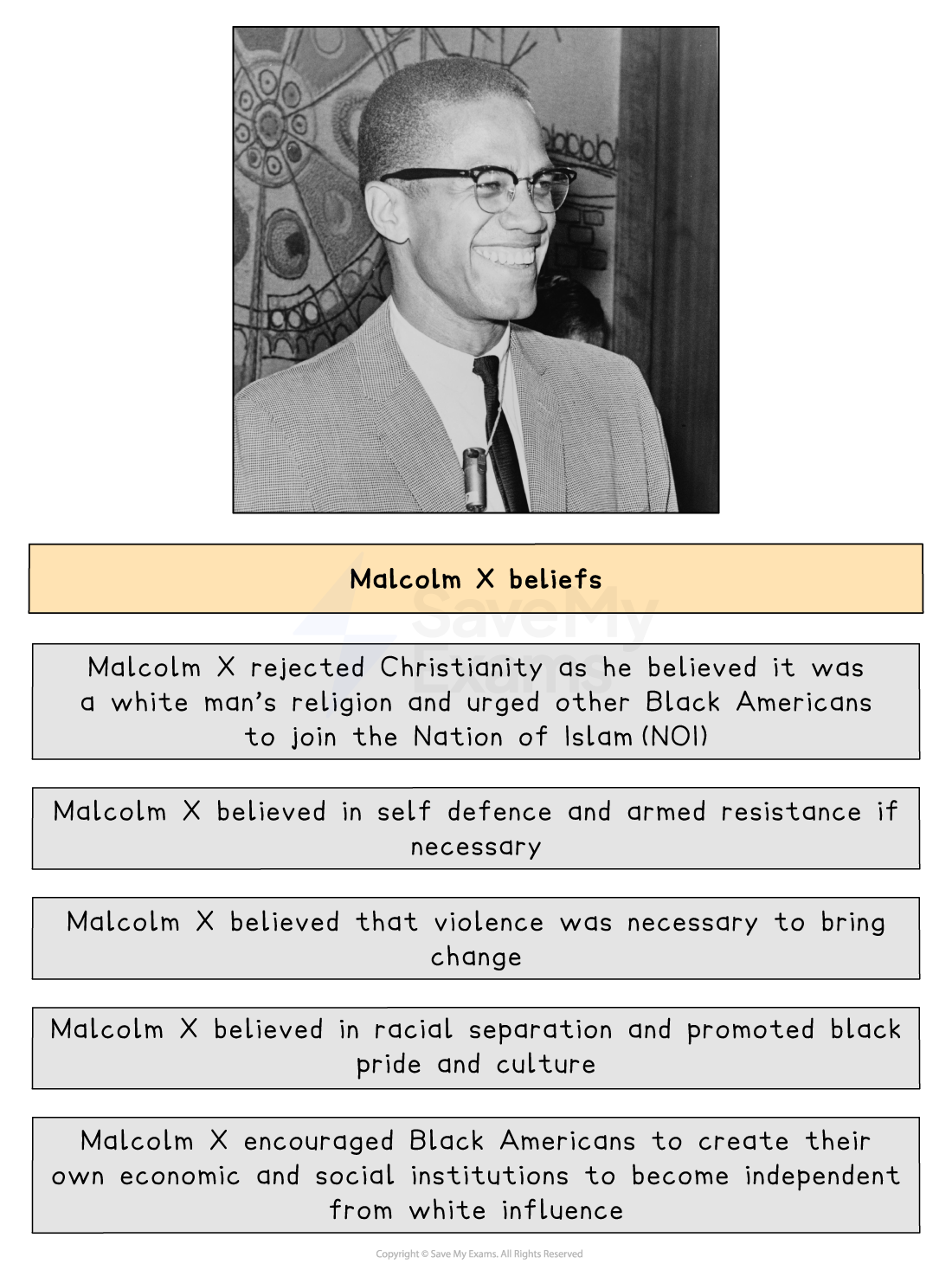Malcolm X (AQA GCSE History): Revision Note
Exam code: 8145
How Significant was Malcolm X to the Civil Rights Movement? - Summary
Malcolm X was a significant figure in the Civil Rights movement as he became one of the most prominent figures of the Black Power Movement.
The nonviolent movement disillusioned some African- Americans. They felt it was ineffective and change would not be achieved. Malcolm X became a spokesperson for these people. He did this by challenging Martin Luther King and addressing many of the issues African -Americans faced in the North of the US.
Malcolm X established many programs through the Nation of Islam (NOI) which helped African- Americans to become involved in the movement. Some would go on to help lead the movement, such as Stokely Carmichael.
Other people believed that Malcolm X encouraged hatred and violence through his speeches. This led many people to support Martin Luther King and peaceful protests. Some historians believe this increased his significance, as this resulted in more politicians being willing to listen to the nonviolent side of the movement, helping to gain Civil Rights for African- Americans.
Who was Malcolm X?
Who was Malcolm X?
Malcolm X was born Malcolm Little in Omaha, Nebraska, in 1925
When Malcolm X was only 6 years old his father was hit by a car and killed.
It is possible that this was an attack by white supremacists, though it was never proven
After his father’s death, his mother was placed in a mental institution
Malcolm X and his siblings were placed in foster care or with family members is
At the age of 21, Malcolm X went to prison for robbery and was sentenced to 8 - 10 years
In jail, Malcolm X became a member of the Nation of Islam (NOI) and changed his name to Malcolm X
Malcolm X’s beliefs
Malcolm X’s beliefs
Malcolm X was a significant figure in the Black Power Movement and held many strong beliefs, such as:
Racial separation
Promotion of Black pride and culture
Self-defence and armed resistance, when necessary
That nonviolent protest was ineffective

Impact of Malcolm X
Impact of Malcolm X
Malcolm X significantly impacted the Civil Rights movement for several reasons. He:
Gave powerful speeches and published writings that focused on:
Empowering African- Americans
Educating African- Americans on issues such as race
Had views and ideas that became the foundation for the Black Power Movement
Became an alternative option for those who had become frustrated by the lack of progress in the nonviolent movement
Inspired individuals such as Stokely Carmicheal and the Black Panthers
Helped increase membership of the NOI from 500 in 1952 to 100,000 in 1963
Set up educational and social programs that were directed towards young urban African Americans
Despite Malcolm X’s popularity within the Black Power Movement, many Americans disliked Malcolm X as they believed his methods encouraged violence and hatred
In 1964, Malcolm X stated he was “here to remind the white man of the alternative to Dr. King”.
Assassination of Malcolm X
While delivering a speech in the Audubon Ballroom in New York City in 1965, Malcolm X was assassinated
There were a number of events leading up to his assassination, including:
Leaving the NOI
A falling out with Elijah Muhammad, the leader of the NOI, over his romantic affairs

Worked Example
Which of the following was the more important reason why the Civil Rights movement made progress in the 1950s and 1960s?
Actions of Martin Luther King Jr.
Actions of Malcolm X
[12 marks]
Partial answer:
The actions of Malcolm X helped to make progress in the Civil Rights movement of the 1960s, to an extent (1). Malcolm X inspired many African- Americans who were disillusioned by the nonviolent movement of the 1950s which helped to push the progression of civil rights, such as Stokely Carmicheal and the Black Panthers (2). Malcolm X also provided important contributions to civil rights through his speeches which empowered many African- Americans and taught them about race relations (1). However, Malcolm X’s assassination in 1965 and the dislike many white Americans had towards him meant that his actions did not help the movement as much as Martin Luther King Jr. did (2).
Examiner Tips and Tricks
The example above is a paragraph to this question. You may notice that it briefly highlights the belief that Martin Luther King Jr., not Malcolm X, was the more important reason as a part of its explanation. This is an example of how an answer can have a substantiated judgement throughout.
To complete this answer, you should add another PEEL paragraph on Martin Luther King Jr. and a conclusion that explains which individual was more important to the progress of the Civil Rights movement

Unlock more, it's free!
Did this page help you?